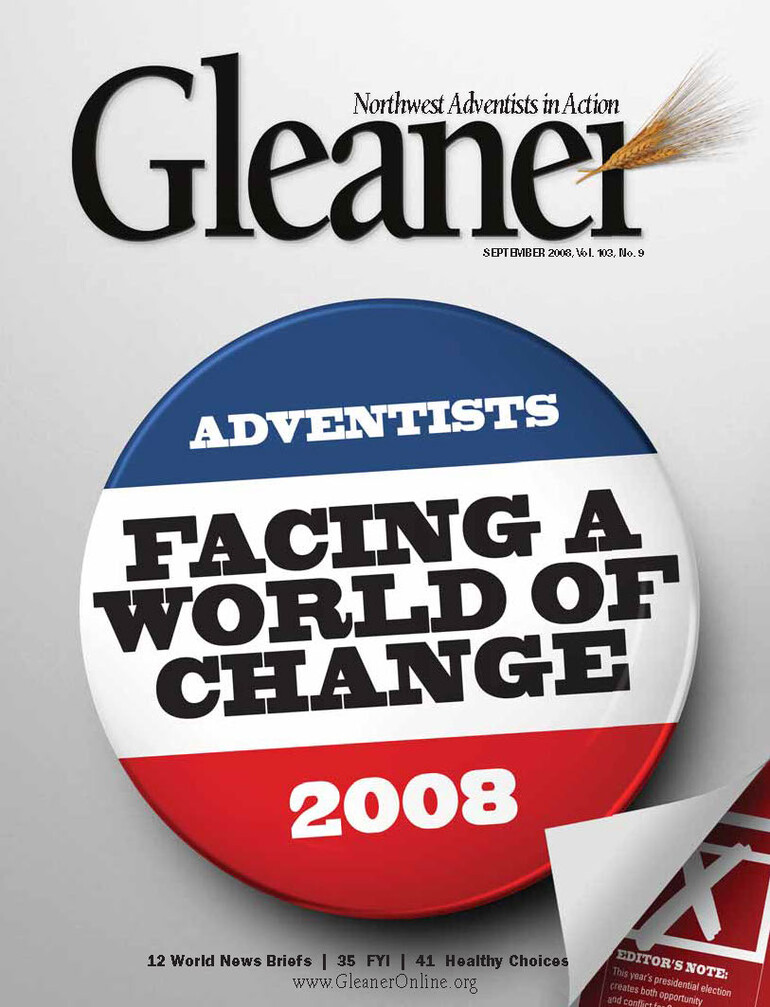Americans are worried. The changes in our world that began after the September 11 tragedies have not abated. Americans see the world as they have known it spinning out of control. Escalating oil prices, crumbling financial infrastructure, the threat of terrorism, topped off by the impending doom of global climate change, create the prospect of a daunting future.
And so, as presidential candidates John McCain and Barack Obama accelerate their respective campaigns toward a November climax, it is no wonder that people are eager for a more hopeful tomorrow. Many will regard the next president as a potential savior—someone who can offer a brighter future; a more stable, safe and sound America.
Adventists may have a more contextual view of the future, based on a firm prophetic outlook. But as they await the Second Coming, some members find themselves conflicted, uncertain how their apocalyptic mission can or should combine with the political concerns of this country—and the upcoming election.
They are not alone in their ambivalence toward the political world.
American Voter's Birthright
One of Mark Twain's famous lines was a remark to a friend about the sudden demise of a politician he did not like. He said, "I did not attend the funeral, but I wrote a nice letter approving it."
Mark Twain's cynicism, while comical, reflects an unavoidable truth about America's seeming love-hate relationship with those whom they elect to public office and the election cycles associated with them. The number of campaign commercials one wades through is just one example of the frustration many Americans experience during each local and national election.
The right to vote has been a central theme since the American Revolution, and subsequently in the aftermath of the Civil War and the Women's Suffrage movement when all of America's citizens were finally guaranteed the right to vote. In addition to the freedoms of religion, speech, the press and right to assemble, the privilege to vote is one of the most fundamental rights enshrined in our Constitution. The 14th, 15th and 19th Amendments, respectively, granted African-Americans, women and all Americans the right to vote.
This Protestant-Puritan heritage of giving every person a voice was once expressed in these words by G. Norman Collie: "Every man is entitled to express his opinions and every other man is entitled not to listen."1
But the democratic process, if not carefully balanced with constitutional parameters, brings potential for not only great good, but great evil, when the majority becomes a despot. Throughout their history, Adventists have understandably watched political movements with a wary eye.
Early Adventists and Political Involvement
Many early Adventist pioneers disdained the act of voting as irrelevant to their mission. Uriah Smith wrote in 1856, "To the question, why we do not with our vote and influence labor against the evil tendency of the times, we reply that our views of prophecy lead us to the conclusion that things will not be bettered..."2
However, the Civil War deeply impressed and shaped the world views of our church's pioneers, as much or more than the events of 9/11 have ours. In May of 1865, near the end of the war, the General Conference convened its third annual session and, with James and Ellen G. White present, approved a resolution as follows: "The act of voting when exercised in behalf of justice, humanity and right, is in itself blameless, and may be at some time highly proper; but the casting of any vote that shall strengthen the cause of such crimes as intemperance, insurrection and slavery, we regard as highly criminal in the sight of Heaven."3
The essence of that resolution remains the core of the Adventist church position today.
Throughout Adventist church history, Ellen G. White represents an interesting dichotomy. For instance, she was known for her electoral and national reform activities—with diet and dress, abolition (i.e., anti-slavery), and prohibition (i.e., outlawing the sale of alcohol) among them. But in 1874 she stated in a letter to her husband, James, that her work "was of another character" when sharing with him the pressure she was receiving from various women to support the women's suffrage movement.
Ellen G. White also urged caution in regard to getting emotionally stuck on personal or party loyalties. She warned against getting caught up in culturally-driven political prejudices and urban legends, or the political arena of special interests and manipulation. She specifically exhorted teachers, pastors, health care personnel, and denominational workers at all levels to refrain from agitating political disputes in our institutions.
In much the same way she viewed labor unions, Ellen G. White saw the political world as increasingly filled with strong-arm tactics, betrayals, and more becoming of a gang-related business than one of civic duty and integrity. Such caution was reflective of the Protestant attitude in her day. This, however, is what caused her to see the need for national reform, especially temperance reform, and led her to be discernibly and enthusiastically pro-active.
She was not hesitant, for example, in getting Seventh-day Adventists and other reform-minded Christians to turn out of office the sitting mayor of Battle Creek, Michigan.
Some have interpreted Ellen G. White's focus on other critical areas as an indication that she advocated passive avoidance of political issues. However she strongly urged active work in favor of religious freedom: "We are not doing the will of God if we sit in quietude, doing nothing to preserve liberty of conscience." 4
Throughout the decades of the Adventist Church's growth it has become clear that a stance on political involvement is based on a clear principle echoed in the Decalogue itself: We should work vigorously in issues that relate to man's relationship with his fellow man (the last six commandments), but carefully avoid exerting political influence to enforce man's relationship with God (the first four commandments).
Challenges We Face Today
So how does this brief history lesson help Adventist members contemplate the challenges ahead? Like some of the early pioneers, should members ignore the elections and focus their full attention on giving a prophetic message? What issues are consistent with the Adventist mission today?
Three factors make this election season unlike any other.
First, no matter who wins, history will be made, with either an African American or a Vietnam War hero selected as the next President of the United States.
Second, to the dismay of many evangelical leaders like Dr. James Dobson, culturally based "wedge" issues such as same-sex marriage, abortion, euthanasia, and stem-cell research have taken a back seat to issues which are causing immediate and critical concern to the average citizen.
And, thirdly, the "savior" factor.
The Savior Factor
With gas prices out of control, mortgage companies failing, the hemorrhaging of Wall Street and the growing global war on terrorism waged by the Western world, and led by the U.S. and Rome, Senators Obama and McCain would be out of touch with the American electorate if they did not speak of "hope" and "change."
This is an important element for Adventists to watch. Already, within the past few years, freedoms we thought would never be abridged have dwindled. Yet, with financial and housing values crumbling and food and fuel costs skyrocketing, many may be willing to even further mortgage long-term freedoms for short-term relief. The promises, therefore, of a "political savior" are worth careful observation.
A New World Council
One proposal that has gained some traction during the current presidential race is the concept for a "League of Democratic Nations."
The perception is growing that the United Nations, including the United Nations Security Council, has proven to be ineffective, and has no real power or authority to affect peace or justice throughout the world.
To many in the foreign policy establishment, this new proposal would admittedly take years to develop and would build on the already established and previously limited Cold War purposes of NATO (North Atlantic Treaty Organization). But to Adventists, this should be considered prophetically significant, because unlike the United Nations, it would possess the power to act with the use of force, if necessary, to bring about world peace. The argument is that it is the best means possible of forcing failed nations, as well as oppressive-rogue-dictatorship nations, to adopt democratic forms of governing, and in turn promote religious freedom. Those strangely contradictory aims mirror similar sentiments expressed by Pope Benedict in favor of "outside intervention" to promote the larger good.
What would take place if the Adventist mission ever crossed purposes with the "larger good" is worthy of thought.
Church-State Conflict
A proposal to dramatically increase federal funding for Faith-Based Initiatives (FBIs) is also cause for concern for it includes the promise of strict governmental regulation to make sure subtle and pervasive "soul-winning" efforts do not take place. Anything beyond "humanitarian" assistance, such as feeding and clothing programs for the indigent, and drug, alcohol and shelter programs (to cite just a few examples), could be strictly prohibited. The current program has not proven heavy-handed in this regard, but the potential is nevertheless there with increased emphases.
One suggested process may either force many charitable organizations to forego their religious mission statements and pervasive religious practices—turning such institutions into mere governmental welfare programs that become almost solely dependent on governmental funding to operate—or it will end up empowering them due to potentially lax and ineffective governmental oversight.
And therein lies a problem: The more social and moral problems are likely to be solved by denominationally and independently-based charitable institutions, the more likely the same entities will secure a governmental powerbase to demand more of government to both fund and implement their religious and political agenda in society. Having a "place at the political table" is the pot of gold they seek. Instead of the saying, "He who owns the gold makes the rules," the new chorus line will be, "They which share the gold makes the rules."
When the government directly funds the church, the most powerful churches with the most established and active charitable organizations, such as Catholic Charities, will receive the most funding and thus the most political power and influence in the long run. Practically and prophetically speaking, this is where we are headed. Ellen G. White confirms this: "When the leading churches of the United States...shall influence the state to enforce their decrees and to sustain their institutions, then Protestant America will have formed an image of the Roman hierarchy, and the infliction of civil penalties upon dissenters will inevitably result."5 Their united demand for a national Sunday law is all that is missing. This is the essential application of what she meant by the word "decrees": making church doctrine—specifically involving the first table of the Moral Decalogue, which defines acts of worship, loyalty and devotion—the law of the land.
An Active Exhortation
So because of potential dangers or future problems, should Adventists stay away from the polls and avoid the possibility of essentially voting in a time of trouble? Our advice would be to simply follow your conscience. And, be mindful of both our church's history and current stance on our privilege as both citizens of heaven and earth to follow Christ's own exhortation to be the "salt of the earth."
And prayerfully consider our church's guideline for active participation in our society: "When Adventists become leaders or exert influence in their wider society, this should be done in a manner consistent with the golden rule. We should therefore work to establish robust religious liberty for all and should not use our influence with political and civil leaders to either advance our faith or inhibit the faith of others. Adventists should take civic responsibilities seriously. We should participate in the voting process available to us when it is possible to do so in good conscience and should share the responsibility of building our communities. Adventists should not, however, become preoccupied with politics, or utilize the pulpit or our publications to advance political theories." 6
- U.S. Constitution and Fascinating Facts About It (Oak Hill Publishing Co., 2004), 63.
- Review and Herald, Sept. 11, 1856.
- Review and Herald, May 23, 1865.
- Testimonies to the Church, Vol. 5, 714.
- (ibid., p. 445, emphasis supplied).
- Declaration of the Seventh-day Adventist Church on Church-State Relations, www.adventist.org.
EDITOR'S NOTE: This year's (2008) presidential election creates both opportunity and conflict for Seventh-day Adventists. While many Adventists have historically tended to vote a traditional line, that trend is changing as party platforms become more complex. There is no official church stance on the current candidates, nor does the GLEANER or this article intend to endorse a specific person. Instead, we hope the following pages will prompt you to carefully consider your own position as an Adventist this November.










